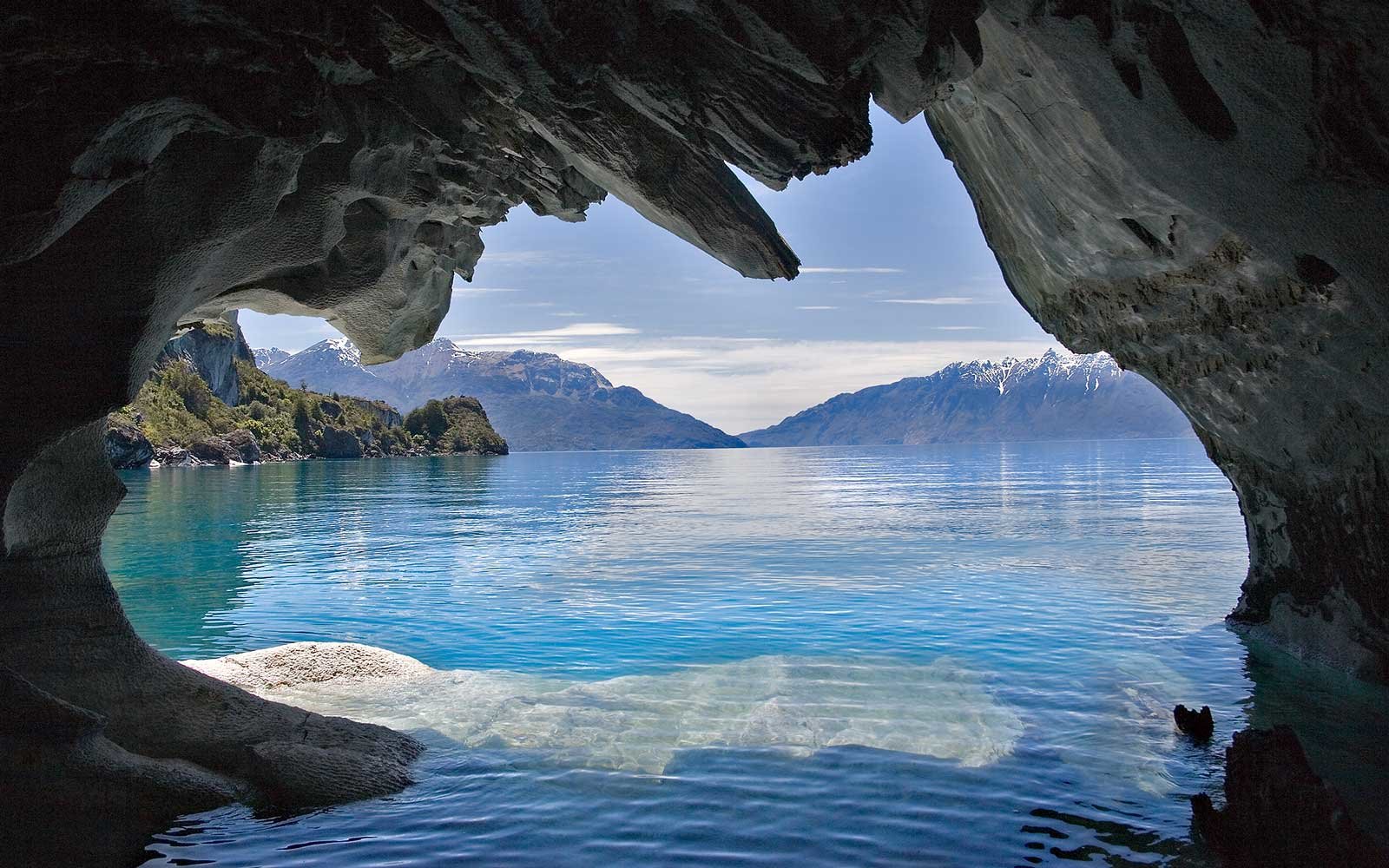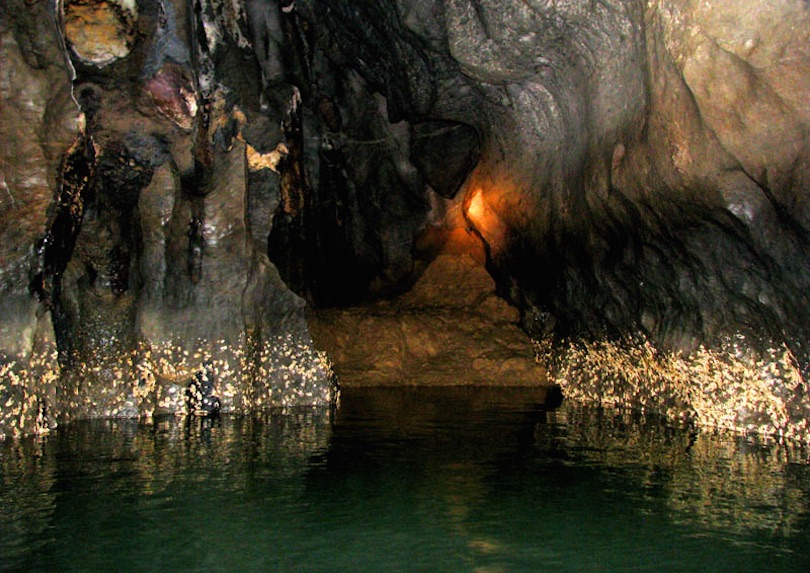Caves have been explored throughout history. In prehistory they were used for shelter, burial, or as religious sites. Today researches study caves because they can reveal details of past climatic conditions. Cavers explore them for the enjoyment of the activity or for physical exercise. For the less adventurous, a number of the most beautiful underground caves have been converted into show caves, where artificial lighting, floors, and other aids allow the casual tourist to experience the cave with minimal inconvenience.
10. Eisriesenwelt Cave
The Eisriesenwelt (German for “World of the Ice Giants”) is largest ice cave in the world, extending more than 42km (26 miles). The cave is inside the Hochkogel mountain in the Tennengebirge section of the Alps in Austria. Eisriesenwelt was formed by a river, which eroded passageways into the mountain. The ice formations in the cave were formed by thawing snow which drained into the cave and froze during winter.
9. Reed Flute Cave
Reed Flute Cave known as “the Palace of Natural Arts” is located in the northwest of Guilin in southern China. According to a legend, Reed Flute Cave got its name because people believed that the reed by the cave’s mouth could be made into flutes. The limestone cave offers a majestic fairyland of stalactites, stalagmites, stone pillars, stone curtains, birds, plants and animals in fantastic shapes and colors.
8. Cave of the Crystals
The Cave of the Crystals was discovered in 2000 by miners excavating a new tunnel for the Naica Mine in northern Mexico. The main chamber contains some of the largest natural crystals ever found in any of the underground caves around the world. The cave’s largest crystal found to date is 11 meters (36 feet) in length, 4 meters (13 feet) in diameter and 55 tons in weight. The crystals became so large because of the extremely hot temperatures inside the cave, reaching a steamy 58 degrees Celsius (136 degrees Fahrenheit), that allowed microscopic crystals to form and grow. The result is an underground cave that Superman fans have been looking for.
7. Puerto Princesa Underground River
The Puerto Princesa Underground River is located in a jungle covered mountain range on the northern coast of the island of Palawan in the Philippines. Until the 2007 discovery of an underground river in Mexico’s Yucatan Peninsula, the Puerto Princesa Underground River was reputed to be the world’s longest underground river and is still the longest navigable underground river. The underground river is 8.2 kilometer (5 miles) long that winds through a spectacular cave before emptying into the South China Sea.
6. Waitomo Caves
The Waitomo Caves are one of New Zealand’s top tourist attractions, located just outside the main Waitomo township. The underground caves are home to the famous Waitomo glowworms, tiny creatures that radiate their luminescent light. These glowworms are found exclusively in New Zealand and around the size of an average mosquito. Formed over 30 million years ago, Waitomo Glowworm Caves have majestic and ornate cave decorations, deep limestone shaft known as the Tomo and the equally magnificent Cathedral cavern known for its superb acoustics.
5. Majlis al Jinn Cave
Majlis al Jinn is one of the largest underground caves in the world located in a remote area of the Selma Plateau in Oman. Majlis al Jinn is a single cave chamber measuring about 310 meters by 225 meters (1,017 by 738 feet), with a domed ceiling 120 meters (393 feet) high. The deepest part of the cave is 178 meters (584 feet) below the top. To put the size in perspective: 12 Boeing 747 jumbo planes would fit inside the cave chamber. The cave is only for experienced climbers although there are some plans to develop Majlis al Jinn into a more easily accessible tourist cave.
4. Skocjan Caves
The Skocjan cave system includes the highest cave hall in Europe, a massive underground gorge, waterfalls and a bridge over the gorge that looks like something out of The Lord of the Rings. The caves have beautiful stalactite and stalagmite structures. The Škocjan Caves are the creation of the sinking Reka River. The river remains on the surface for the first part but suddenly disappears underground, where it continues its way through the caves. The water appears on the surface again after flowing underground for 34 km (21 miles) not far from the Adriatic coast.
3. Carlsbad Caverns
Carlsbad Caverns is a National Park located near Carlsbad, New Mexico. Carlsbad Caverns includes the Big Room, a natural limestone cave chamber which measures 1,219 by 190 meters (4,000 by 625 feet), and 107 meters (350 feet) high at the highest point. It is the seventh largest cave chamber in the world. The caverns are decorated with stalactites, stalagmites and an incredible variety of other formations that can be seen by several easily accessible trails.
2. Jeita Grotto
The Jeita Grotto consists of two separate but interconnected karstic limestone caves: the upper grotto and the lower grotto. The upper gallery houses the world’s largest stalactite – a mineral deposit that hangs from the ceiling of a limestone cave The lower gallery which has an overall length of 6,200 meters (20,300 feet) is located 60 meters (200 feet) below the upper gallery. It is traversed by a smooth underwater river and a lake.
1. Mulu Caves
The Mulu Caves are located in the Gunung Mulu National Park in Borneo and are one of the top tourist attractions in Malaysia. The park encompasses incredible caves and karst formations in a mountainous equatorial rainforest setting. The Sarawak chamber found in one of the underground caves measures 700 by 396 meters (2,300 feet by, 1,300 feet) and at least 70 meters (230 feet) high and is the largest cave chamber in the world. It has been said that the chamber is so big that it could accommodate about 40 Boeing 747s, without overlapping their wings. The enormous colony of Wrinkle-lipped bats in the nearby Deer Cave exit almost every evening in search of food in a spectacular exodus.


































